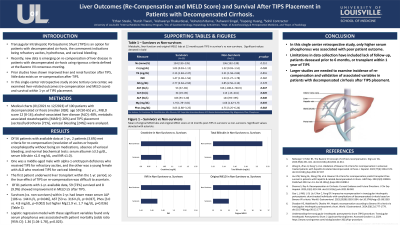Tuesday Poster Session
Category: Liver
P4634 - Liver Outcomes (Re-Compensation and MELD Score) and Survival After TIPS Placement in Patients With Decompensated Cirrhosis
Tuesday, October 29, 2024
10:30 AM - 4:00 PM ET
Location: Exhibit Hall E

Has Audio

Ethan R. Steele, DO
University of Louisville School of Medicine
Louisville, KY
Presenting Author(s)
Harsh Tiwari, MD, Aishwarya Thakurdesai, MD, Ethan R. Steele, DO, Sohail Contractor, MBBS, MD, Ashutosh Barve, MD, PhD, Jiapeng Huang, MD, PhD, Ashwani Singal, MD, MS
University of Louisville School of Medicine, Louisville, KY
Introduction: Transjugular Intrahepatic Portosystemic Shunt (TIPS) is an option for patients with decompensated cirrhosis, the commonest indications being refractory ascites, hydrothorax, and variceal bleeding. Recently, new data is emerging on re-compensation of liver disease in patients with decompensated cirrhosis using rigorous criteria defined at the Baveno VII consensus meeting. Prior studies have shown improved liver and renal function after TIPS, little data exists on re-compensation after TIPS. In this single-center retrospective study at one tertiary care center, we examined liver-related outcomes (re-compensation and MELD score) and survival within 1-yr. of TIPS placement.
Methods: Medical charts (01/2021 to 12/2023) of 100 patients with decompensated cirrhosis (median [IQR]: age 59 [50-65] yrs., MELD score 12 [8-16]; alcohol-associated liver disease [ALD]: 48%, metabolic associated steatohepatitis [MASH]: 26%) and TIPS placement (ascites/hydrothorax [71%], variceal bleeding [24%]) were analyzed.
Results: Of 56 patients with available data at 1-yr., 2 patients (3.6%) met criteria for re-compensation (resolution of ascites or hepatic encephalopathy without being on medications, absence of variceal bleeding, and normal biochemical tests: serum albumin ≥3.5 g/dL, serum bilirubin ≤1.0 mg/dL, and INR ≤1.0). One was a middle-aged male with alpha-1-antitrypsin deficiency who received TIPS for refractory ascites, and the other was a young female with ALD who received TIPS for variceal bleeding. The first patient underwent liver transplant within the 1-yr. period, so the true effect of TIPS on re-compensation was difficult to ascertain. Of 81 patients with 1-yr. available data, 59 (73%) survived and 8 (9.9%) showed improvement in MELD ≥5 after TIPS. Survivors (vs. non-survivors) within 1-yr. had lower mean serum ALP [106 vs. 144 IU/L, p=0.046], AST [53 vs. 316 IU/L, p=0.037], Phos [3.0 vs. 4.8 mg/dL, p=0.002) but higher Mg [1.9 vs. 1.7 mg/dL, p=0.036] (Table 1). Logistic regression model with these significant variables found only serum phosphorus was associated with patient mortality (odds ratio [95% CI]: 1.36 [1.04-1.78], p=0.025).
Discussion: In this single center retrospective study, only higher serum phosphorous was associated with poor patient outcome. Larger studies are needed to examine incidence of re-compensation and validation of associated variables in patients with decompensated cirrhosis after TIPS placement.
Note: The table for this abstract can be viewed in the ePoster Gallery section of the ACG 2024 ePoster Site or in The American Journal of Gastroenterology's abstract supplement issue, both of which will be available starting October 27, 2024.
Disclosures:
Harsh Tiwari, MD, Aishwarya Thakurdesai, MD, Ethan R. Steele, DO, Sohail Contractor, MBBS, MD, Ashutosh Barve, MD, PhD, Jiapeng Huang, MD, PhD, Ashwani Singal, MD, MS. P4634 - Liver Outcomes (Re-Compensation and MELD Score) and Survival After TIPS Placement in Patients With Decompensated Cirrhosis, ACG 2024 Annual Scientific Meeting Abstracts. Philadelphia, PA: American College of Gastroenterology.
University of Louisville School of Medicine, Louisville, KY
Introduction: Transjugular Intrahepatic Portosystemic Shunt (TIPS) is an option for patients with decompensated cirrhosis, the commonest indications being refractory ascites, hydrothorax, and variceal bleeding. Recently, new data is emerging on re-compensation of liver disease in patients with decompensated cirrhosis using rigorous criteria defined at the Baveno VII consensus meeting. Prior studies have shown improved liver and renal function after TIPS, little data exists on re-compensation after TIPS. In this single-center retrospective study at one tertiary care center, we examined liver-related outcomes (re-compensation and MELD score) and survival within 1-yr. of TIPS placement.
Methods: Medical charts (01/2021 to 12/2023) of 100 patients with decompensated cirrhosis (median [IQR]: age 59 [50-65] yrs., MELD score 12 [8-16]; alcohol-associated liver disease [ALD]: 48%, metabolic associated steatohepatitis [MASH]: 26%) and TIPS placement (ascites/hydrothorax [71%], variceal bleeding [24%]) were analyzed.
Results: Of 56 patients with available data at 1-yr., 2 patients (3.6%) met criteria for re-compensation (resolution of ascites or hepatic encephalopathy without being on medications, absence of variceal bleeding, and normal biochemical tests: serum albumin ≥3.5 g/dL, serum bilirubin ≤1.0 mg/dL, and INR ≤1.0). One was a middle-aged male with alpha-1-antitrypsin deficiency who received TIPS for refractory ascites, and the other was a young female with ALD who received TIPS for variceal bleeding. The first patient underwent liver transplant within the 1-yr. period, so the true effect of TIPS on re-compensation was difficult to ascertain. Of 81 patients with 1-yr. available data, 59 (73%) survived and 8 (9.9%) showed improvement in MELD ≥5 after TIPS. Survivors (vs. non-survivors) within 1-yr. had lower mean serum ALP [106 vs. 144 IU/L, p=0.046], AST [53 vs. 316 IU/L, p=0.037], Phos [3.0 vs. 4.8 mg/dL, p=0.002) but higher Mg [1.9 vs. 1.7 mg/dL, p=0.036] (Table 1). Logistic regression model with these significant variables found only serum phosphorus was associated with patient mortality (odds ratio [95% CI]: 1.36 [1.04-1.78], p=0.025).
Discussion: In this single center retrospective study, only higher serum phosphorous was associated with poor patient outcome. Larger studies are needed to examine incidence of re-compensation and validation of associated variables in patients with decompensated cirrhosis after TIPS placement.
Note: The table for this abstract can be viewed in the ePoster Gallery section of the ACG 2024 ePoster Site or in The American Journal of Gastroenterology's abstract supplement issue, both of which will be available starting October 27, 2024.
Disclosures:
Harsh Tiwari indicated no relevant financial relationships.
Aishwarya Thakurdesai indicated no relevant financial relationships.
Ethan Steele indicated no relevant financial relationships.
Sohail Contractor indicated no relevant financial relationships.
Ashutosh Barve indicated no relevant financial relationships.
Jiapeng Huang indicated no relevant financial relationships.
Ashwani Singal indicated no relevant financial relationships.
Harsh Tiwari, MD, Aishwarya Thakurdesai, MD, Ethan R. Steele, DO, Sohail Contractor, MBBS, MD, Ashutosh Barve, MD, PhD, Jiapeng Huang, MD, PhD, Ashwani Singal, MD, MS. P4634 - Liver Outcomes (Re-Compensation and MELD Score) and Survival After TIPS Placement in Patients With Decompensated Cirrhosis, ACG 2024 Annual Scientific Meeting Abstracts. Philadelphia, PA: American College of Gastroenterology.
